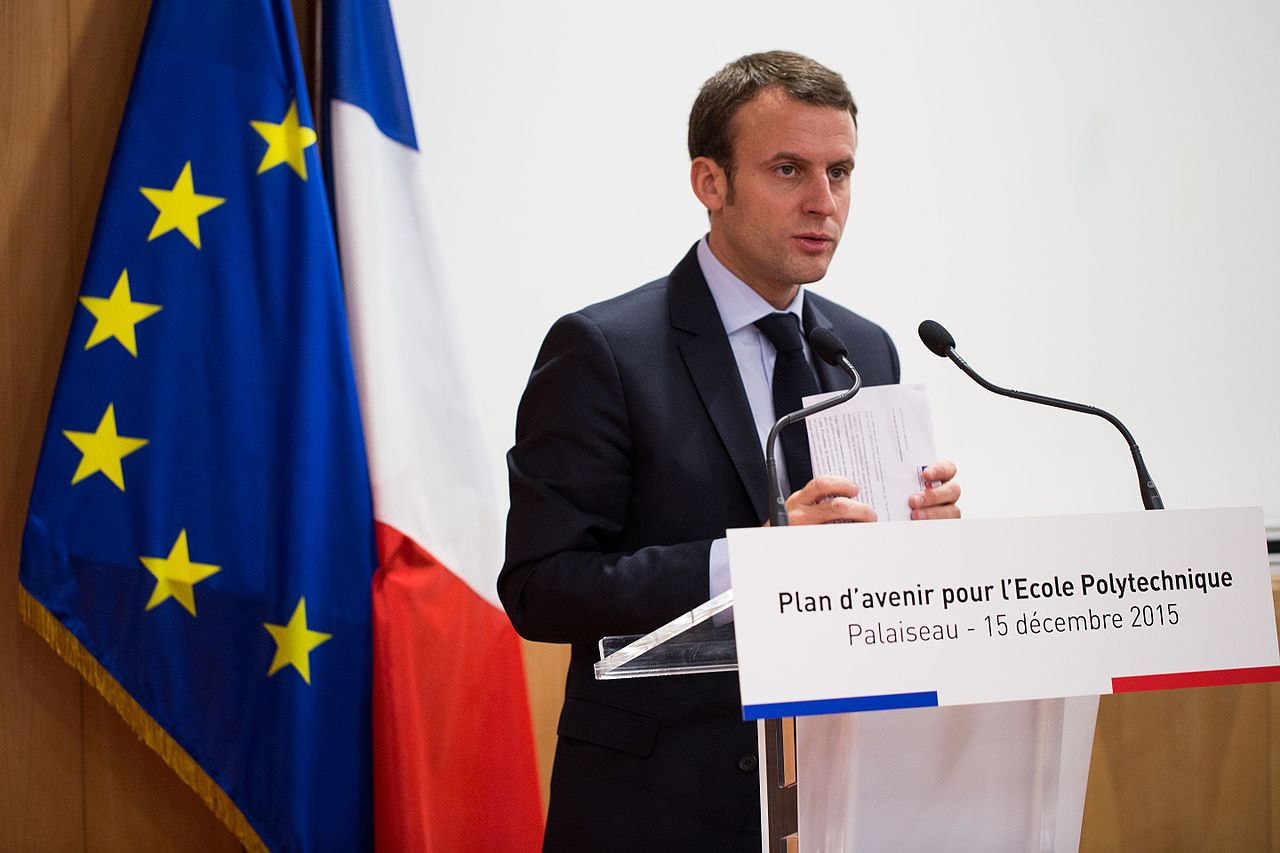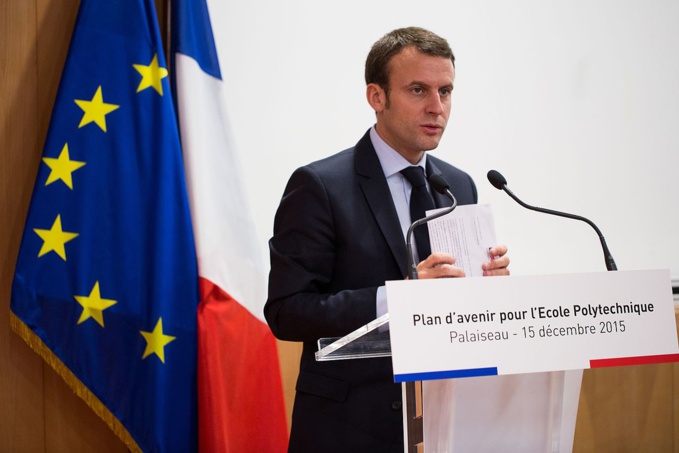However, this wonderful plan did not work out. His German partner, Merkel, is still busy with formation of a new government because of the difficult results of the elections. In addition, one potential partner for a coalition is of low opinion of Macron's ideas about a deeper Europe, at least about his economic views.
Berlin’s reluctance has become clear on Tuesday morning. On the day of Macron's big speech at the Sorbonne University in Berlin, the outgoing German government distributed a document where it stated its position. The paper said about a clear rejection of any form of shared responsibility. "We must be able to create real stability through reforms, rather than through complex and expensive financial designs," Bloomberg news service quoted the Ministry of Finance’s statement.
Introduction of the post of finance minister for the euro area, which would manage the joint budget of 19 eurozone member countries, has long been mentioned among the central requirements of the French president. At that, Macron sees its own budget, in which members of the monetary union pay three to four percent of their GDP. Immediately the amount would amount to 428 billion euros.
Germany, as the largest member of the Euro-club, would have to pay nearly 30% of the total pot. German critics are especially afraid of joining a transfer union, in which money will be transferred from strong countries to weak ones. Indeed, such fiscal benefits could destroy attractiveness of reforms or lead to other wrong directions of development. The German alignment of the financial possibilities of the federal states is a perfect example. Some federal states are even ready to more sluggishly collect taxes only to pay less to other lands.
German economists consider this idea fatal. They are in favor of a new start for the eurozone, which, however, must offer a real attraction and a system of penalties, so that the Euro 2.0 system will work stably.
Counterproposal: total centralization
Sound approach to things implies only two stable models of the future. The first is that national states retain their own national freedoms, that is, they can determine their own budgets without much intervention from Brussels. Then the relevant governments should also assume responsibility for their actions, that is, they can also go bankrupt in the case of excessive debt. This project initially preceded creation of a monetary union and is reflected, for example, in the Maastricht Treaty.
The counter project is full centralization. Here, decisions and responsibilities become common. So far, the euro area has been using a little of both projects with a correspondingly modest result. Finance ministers still have the right to their budgets. In the event of fiscal imbalances, the European rescue mechanism (ESM) intervenes and thus prevents the state from bankruptcy. At the same time, the European Central Bank buys government bonds for billions of dollars and thus cares to ensure that interest remains low and none of the finance ministers will face problems in the market. That is, actions and responsibilities are separated from each other, which creates dramatic incorrect motivations and, above all, bury all efforts to carry out reforms.
Macron’s idea about the European Monetary Fund is a sort of IWF for the euro area. In the eyes of German economists, it would only stabilize this wrong system. Although such an institution could have offered first aid in the event of bank failures or financial crises, there is a tendency, when such instances are destroyed politically, and money for help is used for less important purposes.
Another idea about a common army and a joint military budget has more supporters. However, this proposal would have cost Germany too much. Now, Germany pays only 1.2% of its GDP for defense. This share is much higher in other countries of the euro area. For example, in France this is 2.3% - almost twice as much. With a general budget, member countries will have to pay the same share. This will inevitably entail higher military expenditures for Germany.
Germany may show much more interest to Macron's proposal to impose a tax on financial transactions. The income from them must be transferred to the EU's general development fund. For the UK, which is unlikely to be interested in such an action, this measure would be a welcome reason to once again raise its own financial industry after Brexit. Such a model has long been discussed inside the EU, but without success so far. The fact that this will change something in the current situation is questioned.
Also, Germany could support the proposal of the French president to increase the tax on CO2 to force large air pollutants to pay. In the markets, the price for the right to carbon dioxide emissions has grown from 4.35 euros in May to 7 euros currently.
source: welt.de
Berlin’s reluctance has become clear on Tuesday morning. On the day of Macron's big speech at the Sorbonne University in Berlin, the outgoing German government distributed a document where it stated its position. The paper said about a clear rejection of any form of shared responsibility. "We must be able to create real stability through reforms, rather than through complex and expensive financial designs," Bloomberg news service quoted the Ministry of Finance’s statement.
Introduction of the post of finance minister for the euro area, which would manage the joint budget of 19 eurozone member countries, has long been mentioned among the central requirements of the French president. At that, Macron sees its own budget, in which members of the monetary union pay three to four percent of their GDP. Immediately the amount would amount to 428 billion euros.
Germany, as the largest member of the Euro-club, would have to pay nearly 30% of the total pot. German critics are especially afraid of joining a transfer union, in which money will be transferred from strong countries to weak ones. Indeed, such fiscal benefits could destroy attractiveness of reforms or lead to other wrong directions of development. The German alignment of the financial possibilities of the federal states is a perfect example. Some federal states are even ready to more sluggishly collect taxes only to pay less to other lands.
German economists consider this idea fatal. They are in favor of a new start for the eurozone, which, however, must offer a real attraction and a system of penalties, so that the Euro 2.0 system will work stably.
Counterproposal: total centralization
Sound approach to things implies only two stable models of the future. The first is that national states retain their own national freedoms, that is, they can determine their own budgets without much intervention from Brussels. Then the relevant governments should also assume responsibility for their actions, that is, they can also go bankrupt in the case of excessive debt. This project initially preceded creation of a monetary union and is reflected, for example, in the Maastricht Treaty.
The counter project is full centralization. Here, decisions and responsibilities become common. So far, the euro area has been using a little of both projects with a correspondingly modest result. Finance ministers still have the right to their budgets. In the event of fiscal imbalances, the European rescue mechanism (ESM) intervenes and thus prevents the state from bankruptcy. At the same time, the European Central Bank buys government bonds for billions of dollars and thus cares to ensure that interest remains low and none of the finance ministers will face problems in the market. That is, actions and responsibilities are separated from each other, which creates dramatic incorrect motivations and, above all, bury all efforts to carry out reforms.
Macron’s idea about the European Monetary Fund is a sort of IWF for the euro area. In the eyes of German economists, it would only stabilize this wrong system. Although such an institution could have offered first aid in the event of bank failures or financial crises, there is a tendency, when such instances are destroyed politically, and money for help is used for less important purposes.
Another idea about a common army and a joint military budget has more supporters. However, this proposal would have cost Germany too much. Now, Germany pays only 1.2% of its GDP for defense. This share is much higher in other countries of the euro area. For example, in France this is 2.3% - almost twice as much. With a general budget, member countries will have to pay the same share. This will inevitably entail higher military expenditures for Germany.
Germany may show much more interest to Macron's proposal to impose a tax on financial transactions. The income from them must be transferred to the EU's general development fund. For the UK, which is unlikely to be interested in such an action, this measure would be a welcome reason to once again raise its own financial industry after Brexit. Such a model has long been discussed inside the EU, but without success so far. The fact that this will change something in the current situation is questioned.
Also, Germany could support the proposal of the French president to increase the tax on CO2 to force large air pollutants to pay. In the markets, the price for the right to carbon dioxide emissions has grown from 4.35 euros in May to 7 euros currently.
source: welt.de



















